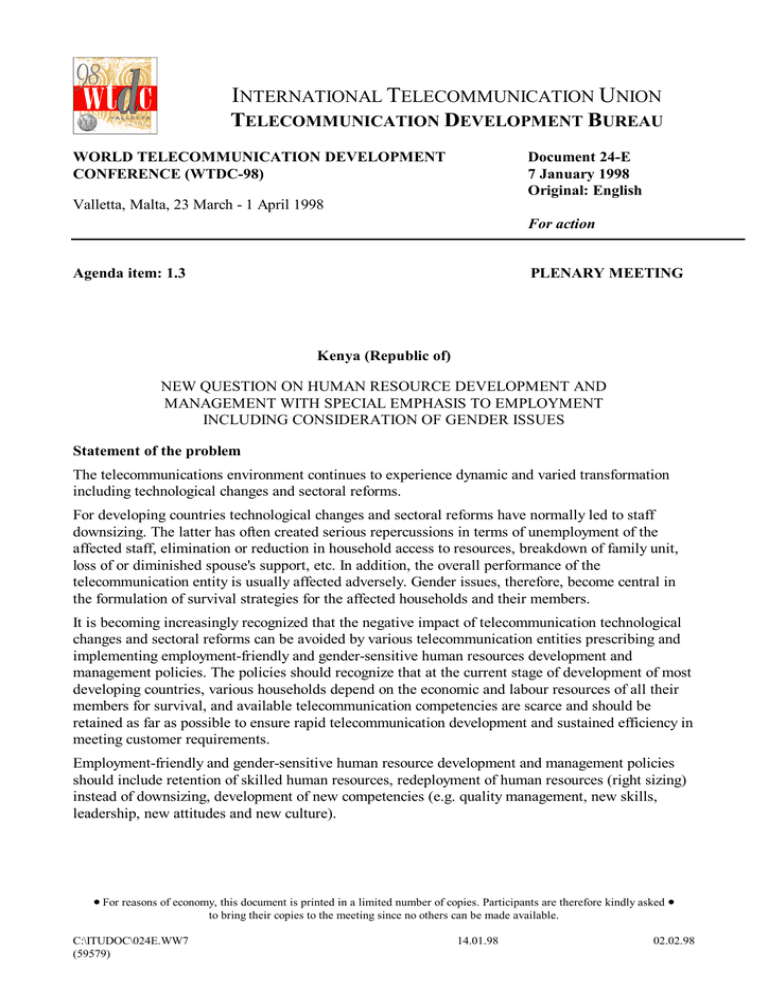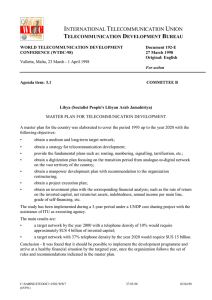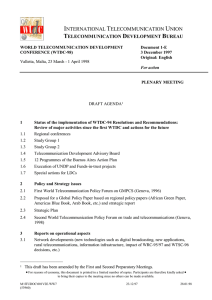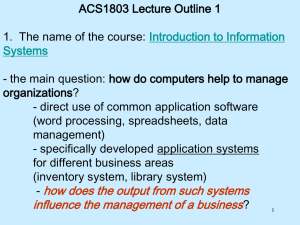I T U D
advertisement

I NTERNATIONAL TELECOMMUNICATION UNION TELECOMMUNICATION DEVELOPMENT BUREAU Document 24-E 7 January 1998 Original: English WORLD TELECOMMUNICATION DEVELOPMENT CONFERENCE (WTDC-98) Valletta, Malta, 23 March - 1 April 1998 For action Agenda item: 1.3 PLENARY MEETING Kenya (Republic of) NEW QUESTION ON HUMAN RESOURCE DEVELOPMENT AND MANAGEMENT WITH SPECIAL EMPHASIS TO EMPLOYMENT INCLUDING CONSIDERATION OF GENDER ISSUES Statement of the problem The telecommunications environment continues to experience dynamic and varied transformation including technological changes and sectoral reforms. For developing countries technological changes and sectoral reforms have normally led to staff downsizing. The latter has often created serious repercussions in terms of unemployment of the affected staff, elimination or reduction in household access to resources, breakdown of family unit, loss of or diminished spouse's support, etc. In addition, the overall performance of the telecommunication entity is usually affected adversely. Gender issues, therefore, become central in the formulation of survival strategies for the affected households and their members. It is becoming increasingly recognized that the negative impact of telecommunication technological changes and sectoral reforms can be avoided by various telecommunication entities prescribing and implementing employment-friendly and gender-sensitive human resources development and management policies. The policies should recognize that at the current stage of development of most developing countries, various households depend on the economic and labour resources of all their members for survival, and available telecommunication competencies are scarce and should be retained as far as possible to ensure rapid telecommunication development and sustained efficiency in meeting customer requirements. Employment-friendly and gender-sensitive human resource development and management policies should include retention of skilled human resources, redeployment of human resources (right sizing) instead of downsizing, development of new competencies (e.g. quality management, new skills, leadership, new attitudes and new culture). •For reasons of economy, this document is printed in a limited number of copies. Participants are therefore kindly asked • to bring their copies to the meeting since no others can be made available. C:\ITUDOC\024E.WW7 (59579) 14.01.98 02.02.98 -2CMDT98/24-E Question proposed for study 1 Identity relevant telecommunication technological changes and sectoral reforms as well as associated human resource development and management policies and evaluate their impact on employment including gender issues in developing countries. 2 Formulate employment-friendly and gender-sensitive human resource development and management programmes and methods necessitated by telecommunication technological changes and sectoral reforms. 3 Formulate suitable guidelines and recommendations on human resource development and management for use by developing countries to ensure that telecommunication technological changes and sectoral reforms that may be undertaken fully benefit these economies without creating unemployment and are gender-sensitive. Expected output 1 An analysis of telecommunication technological changes and sectoral reforms as well as associated human resource development and management policies and their impact on employment including gender issues in developing countries. 2 Employment-friendly and gender-sensitive human resource development and management programmes and methods necessitated by telecommunication technological changes and sectoral reforms in developing countries. 3 Guidelines and recommendations on employment-friendly and gender-sensitive HRD and HRM policies for use by developing countries. Required timing of the expected output Mid-2000. Sources of input required in undertaking the study – Member States. – Sector Members. – UN agencies. – Regional groups. Target audience for the output Developed countries Developing countries LDCs Telecom policy makers * * * Telecom regulators * * * Service providers * * * Manufacturers * * * Proposed method of handling the Question Expert group within regular BDT activity. C:\ITUDOC\024E.WW7 (59579) 14.01.98 02.02.98


